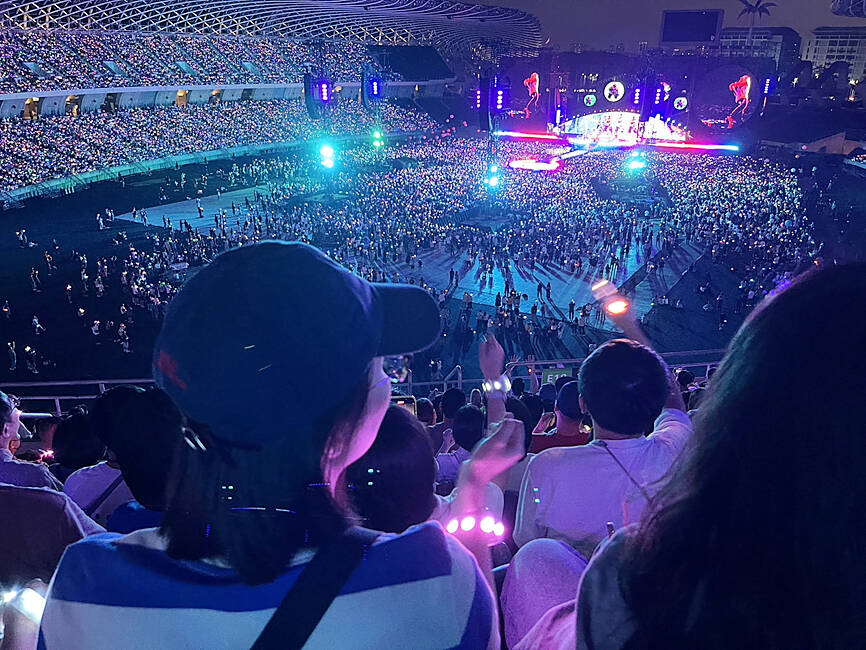Concerts by British band Coldplay at the Kaohsiung National Stadium attracted more than 170,000 fans over the weekend and generated about NT$550 million (US$17.18 million) in revenue, the city government said on Monday.
On Sunday, the number of people in and around the stadium peaked at 86,505, a record for the venue, it said in a statement.
The stadium and areas around it were visited by more than 170,000 people over the two days, boosting sales at night markets by at least 30 percent and lifting occupancy rates at downtown hotels to 90 percent, it said.

Photo: CNA
To facilitate transportation of fans, the city coordinated with the Kaohsiung MRT to increase rail services and arranged shuttle buses, it said.
It took 82 and 88 minutes to disperse the crowds on Saturday and Sunday respectively, the city said.
Of the 170,000 people who attended, 70 percent were from outside Kaohsiung, including overseas visitors from Hong Kong, Macau, Europe, North America and Southeast Asia, Kaohsiung Tourism Bureau data showed.
Separately, the Kaohsiung City Government on Wednesday said that the stadium, which has a capacity of 55,000, is the only stadium in Taiwan that can hold more than 45,000 people.
The stadium has received a “gold” rating from the central government for its environmental design, which is in line with Coldplay’s advocacy for environmental sustainability, the city government said.
Designed by Japanese architect Toyo Ito, the dragon-shaped stadium’s main structure has 8,844 solar panels that can generate 1.1 million kilowatts of electricity annually, reducing carbon dioxide emissions by 660 tonnes per year, it said.
Coldplay aims to make its Music of the Spheres world tour “as sustainable and low-carbon as possible,” mainly by cutting carbon emissions by 50 percent compared with their previous tours in 2016 and 2017, and supporting new green technologies, the band said on its Web site.
To encourage recycling, Coldplay asked concert-goers to return their LED wristbands after the shows, the city government said.
At the band’s first Kaohsiung concert on Saturday, the recycling rate for LED wristbands was 93 percent, the city government said.

POSITIVE DEVELOPMENT: Japan and the US are expected to hold in-depth discussions on Taiwan-related issues during the meeting next month, Japanese sources said The holding of a Japan-US leaders’ meeting ahead of US President Donald Trump’s visit to China is positive news for Taiwan, former Japan-Taiwan Exchange Association representative Hiroyasu Izumi said yesterday. After the Liberal Democratic Party’s landslide victory in Japan’s House of Representatives election, Japanese Prime Minister Sanae Takaichi is scheduled to visit the US next month, where she is to meet with Trump ahead of the US president’s planned visit to China from March 31 to April 2 for a meeting with Chinese President Xi Jinping (習近平). Japan and the US are expected to hold in-depth discussions on Taiwan-related issues during the

‘LIKE-MINDED PARTNER’: Tako van Popta said it would be inappropriate to delay signing the deal with Taiwan because of China, adding he would promote the issue Canadian senators have stressed Taiwan’s importance for international trade and expressed enthusiasm for ensuring the Taiwan-Canada trade cooperation framework agreement is implemented this year. Representative to Canada Harry Tseng (曾厚仁) in an interview with the Central News Agency (CNA) said he was increasingly uneasy about Ottawa’s delays in signing the agreement, especially as Ottawa has warmed toward Beijing. There are “no negotiations left. Not only [is it] initialed, we have three versions of the text ready: English, French and Mandarin,” Tseng said. “That tells you how close we are to the final signature.” Tseng said that he hoped Canadian Prime Minister Mark Carney

President William Lai (賴清德) yesterday bestowed one of Taiwan’s highest honors on Saint Vincent and the Grenadines (SVG) Ambassador Andrea Clare Bowman in recognition of her contributions to bilateral ties. “By conferring the Order of Brilliant Star with Grand Cordon on Ambassador Bowman today, I want to sincerely thank her, on behalf of the Taiwanese people, for her outstanding contribution to deepening diplomatic ties between Taiwan and SVG,” Lai said at a ceremony held at the Presidential Office in Taipei. He noted that Bowman became SVG’s first ambassador to Taiwan in 2019 and

A man walks past elementary school artworks at the Taipei Lantern Festival in Ximen District yesterday, the first day of the event. The festival is to run from 5pm to 10pm through March 15.